The German offensive in the north of Stalingrad, which had been launched on 14 October, finally ground to a halt; the Russian winter was coming, and the Germans began to dig in. In the Western Desert the battle of El Alamein continued, becoming a brutal war of attrition, of attack and counter-attack; but the Allies had more men, tanks and – crucially – fuel, and by the end of the week Rommel was planning his retreat. In the Pacific, a Japanese fleet was damaged at the battle of Santa Cruz, and US Marines began an offensive at Matanikau on Guadalcanal.
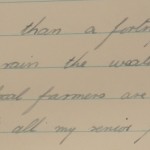 In Caithness bad weather had affected the bringing in of the harvest, as the head teacher for Bower School recorded in the log book for 30 October: “After more than a fortnight of almost continuous rain the weather has dried today and the local farmers are busy at the harvest. Have sent out all my senior pupils who could assist.”
In Caithness bad weather had affected the bringing in of the harvest, as the head teacher for Bower School recorded in the log book for 30 October: “After more than a fortnight of almost continuous rain the weather has dried today and the local farmers are busy at the harvest. Have sent out all my senior pupils who could assist.”
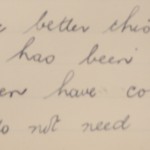
Ackergill School responded to the conditions with a homely remedy – cocoa. “This week has been stormy but all the children have cocoa at one o’clock and thus do not need to go home.”
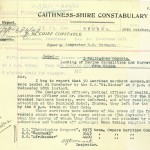 No less than fifty American merchant seamen were landed at Scrabster on 28 October. The Police report notes, “These survivors were members of the crews of … vessels which were sunk by enemy action on 13th September last, when the convoy of which they formed part was attacked by enemy submarines and bombers off Archangel when taking supplies to Russia.” This was convoy PQ-18, the first convoy to have an aircraft carrier support: in all 13 ships out of 44 were sunk, while the Germans lost three U-boats and 40 aircraft.
No less than fifty American merchant seamen were landed at Scrabster on 28 October. The Police report notes, “These survivors were members of the crews of … vessels which were sunk by enemy action on 13th September last, when the convoy of which they formed part was attacked by enemy submarines and bombers off Archangel when taking supplies to Russia.” This was convoy PQ-18, the first convoy to have an aircraft carrier support: in all 13 ships out of 44 were sunk, while the Germans lost three U-boats and 40 aircraft.
Wick School management Committee debated the question of supplying boots to poor children, as the John 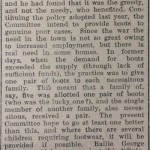 O’Groat Journal reported this week. “Continuing the policy adopted last year, the Committee intend to provide boots to genuine poor cases. Since the war the need in the town is not so great owing to increased employment, but there was real need in some homes.” In previous years when demand had outstripped funds for supply, each family had received one pair of boots (as the paper wondered, “who was the lucky one?”); but now the members agreed that they “had power to provide food, clothing and boots to necessitous children.”
O’Groat Journal reported this week. “Continuing the policy adopted last year, the Committee intend to provide boots to genuine poor cases. Since the war the need in the town is not so great owing to increased employment, but there was real need in some homes.” In previous years when demand had outstripped funds for supply, each family had received one pair of boots (as the paper wondered, “who was the lucky one?”); but now the members agreed that they “had power to provide food, clothing and boots to necessitous children.”
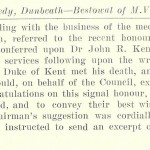 Finally this week, Wick Burgh Council noted that Dr John R. Kennedy, Dunbeath, had been awarded the M.V.O., “in recognition of his services following upon the wreck of the plane in which H.R.H. the Duke of Kent met his death”. Dr Kennedy, who was 71, had attended the scene of the accident and identified the duke among the casualties, and had later accompanied the King to the crash site. The ceremony took place in the royal train when it stopped at Aberdeen.
Finally this week, Wick Burgh Council noted that Dr John R. Kennedy, Dunbeath, had been awarded the M.V.O., “in recognition of his services following upon the wreck of the plane in which H.R.H. the Duke of Kent met his death”. Dr Kennedy, who was 71, had attended the scene of the accident and identified the duke among the casualties, and had later accompanied the King to the crash site. The ceremony took place in the royal train when it stopped at Aberdeen.
